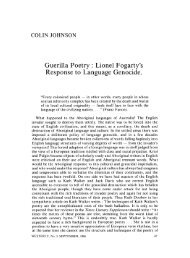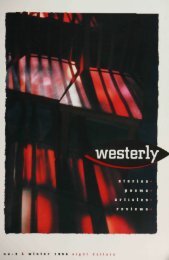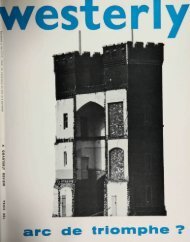Create successful ePaper yourself
Turn your PDF publications into a flip-book with our unique Google optimized e-Paper software.
REVIEWSMars, Arthur Boyd and Peter Porter, London,Andre Deutsch, 1988, lllp.Mars, an entire book of poems written tocommission on the subject of war? exploredthrough dry old Greek mythology? and thenbrought out in an expensive glossy edition ofpoems and pictures which the dust-jacketproudly and rightly calls "beautifully produced"?Come on, wrong from the start surely. This kindof response to Mars, Peter Porter's fourthcollaboration with Arthur Boyd, is at one andthe same time too facile and yet irresistible andcontained within the book itself.Porter's poems start from the commissionedsubject but are in no way limited by it. While-!J?rs is the product of two artists my interestIS In the poetry rather than in Boyd's cartoonswhich with their compulsive exploration ofcarnality associated with violence complementPorter's poems. In the 1987 essay on hiscollaborations "Working with Arthur Boyd"(published in <strong>Westerly</strong>, no. I, March 1987: 69-78), Porter describes the process of thecollaborations with Boyd:I have been given the subject and allowed todevelop it as ~ saw fit,. being simply plonkeddown on a Wide-ranging theme and told towrite poems to it. Arthur would then do thepictures in whatever form he fancied and theend product would be the two sets ofartworks issued together in a book. (1987, 70)I~ may well be that Mars, particularly comingstratght after Porter's recent and much moreattractive volume The Automatic Oracle(Oxford, 1987), will subside from attention tosettle in footnotes of future Porter-studies.Paradoxically the glossy production may greasethe slopes for the book's descent from attention.Should this prove the case it will be the reader'sloss, for, even against the weightier TheAutomatic Oracle, Mars offers ample challengesand rewards. Porter has affirmed theimportance he places on his collaborations, andhopes "that Mars will turn out to be our mostsuccessful collaboration so far" (1987, 78).Porter's poetry is by now well known andadmired for its inventive, intelligent andquestioning temper which embraces contradiction.The radical sceptic whose hermetic selfreflexivefictions despair of his own attempts atcommunication exists between the same coversWESTERLY, No.2, JUNE, 1989as the socially engaged satirist and moralist. InMars, Porter brings the conflicting tendencies towhat is perhaps their most extreme testing sitein his work to date - the extended explorationof war and poetry. Porter knows the easy iffundamental questions, and looks for answersthat will satisfy sooner than please. He also asksquestions that the reader becomes aware of onlyafter the event. It is part of the poet'sachievement in Mars that he is able to revitalizeand explore the topic while dressing the looselyconnected sequence in the faded old repertorywardrobe of classical mythology.The relationship of power and violence toculture, of war to poetry (or the other wayaround), has troubled Western-derived culturessince Homer set down the agenda. Through hismythological material drawn directly from bothThe Iliad and The Odyssey, Porter calls attentionto the central position held by the masculinistwarrior tradition in our culture.The relation of war to culture raisesfundamental questions for Western Humanism.For the poets an immediate aspect of theproblem is their role. Reliance on patronageinevitably means praising the warrior-bossesand glorifying the brutality which underwritesprivilege. Language is implicated inextricably inthe blood sports. Porter suggests: "Whereverlanguage came from/ it learned to please itsmasters soon enough:/it gives a certain cachetto the dead" (p.1Ol). The topic calls into questionthe pedagogic moral efficacy of culture, thevalue of poets as unacknowledged educators andlegislators. A~den, who loathed Shelley'sdefinition, continued to engage with politicalissues, from "Spain" to "The Shield of Achilles".The poet, seemingly for his own sake as a humanbeing, had to write what he elsewhere declaredwas futile.Porter, writing with his intense investment inthe tradition of erudite yet "cosy" conversationinvigorated by Auden, is also troubled with thepolitical question. In Mars, he wonders whetherwriting about the violence and suffering ofothers is an act of more than a little bad faith.Is the poet making capital out of irijustice,creating self-aggrandising "beautifully produced"artefacts out of real horror andoppression? Or is that in fact art's justificationand glory? Porter questions further, askingwhether it may not prove that violence is at thecentre of and sustains art in the individual and103







